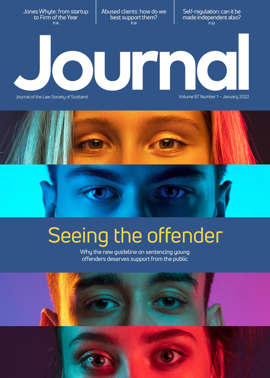Seeking remedies for the abused

My client, A, wrote at Journal, December 2021, 16 about his experience as the pursuer in the recent case of A v Glasgow City Council. I was his solicitor and main contact, but his wider legal team included senior and junior counsel, junior solicitors and support staff at Thompsons.
The point we have reached at the conclusion of this case, coupled with the welcomed comments from our client, have created a point of reflection: are we really doing enough as lawyers, as a profession, to support those who have suffered such trauma in their lives? This is not only relevant to survivors of historical abuse but to any pursuer who has suffered life changing injury.
We dedicated a team of solicitors to this new area of work as we have tried to navigate new legislation and learn more about our clients, all of whom are survivors of historical abuse, to allow us to form better working relationships with them but also ensure that we can pursue their cases in the best way possible. Our experiences thus far have very much been a rollercoaster of emotions. While we have felt this on personal and professional levels, we have very much worked as team, shared losses and successes and have plenty of support available, from counsellors to colleagues and fellow professionals. These points are, of course, all about us. What though for our clients? I do continually ask myself whether we are doing enough to support them, and can we do more.
Re-traumatisation
At the outset of embarking on this work, we attempted to make decisions about processes which we thought were in our clients’ best interests. At that point, though, we could not have understood what those interests were, and of course they will vary from case to case. Our understanding has come from experience. At the outset, we listened to advice from professionals, those medically qualified and working with survivors. One of the key points made was the dangers to their health from continual re-traumatisation, often caused by recounting their story time and time again.
One focused effort was our attempt to instruct experts jointly, at least in the first instance, to reduce the need for recounting stories as well as the stressful nature of these situations. This was met with resistance, and we soon realised that in most cases this was just not going to be possible within our fairly rigid system. We sought out and instructed “fresh” experts not traditionally involved in litigations but with extensive experiences of working with survivors of historical abuse, but this was not sufficiently attractive to engage defenders. It was rather frustrating that at the point of the joint pre-proof meeting of the experts in A v Glasgow City Council, much agreement was then actually reached. I appreciate though that defenders’ agents are bound by the views of those instructing them, and there are parts of process which will likely just need to be followed unless either party insists on court intervention.
Need for protection
One effort which we made and have not deviated on is ensuring that our clients’ anonymity is protected from the outset of a case. Some will choose to waive this right as part of their journey, but whilst in our hands, we will seek to ensure this at every stage. Our anonymous letters of claim caused confusion initially, and appear still to irritate some insurers, but we are grateful to defenders’ agents for their understanding of this position and for developing their systems accordingly. Our insistence on that issue is probably one of the unique points in handling these cases that we have been most consistent about, and the more we have understood and experienced the cases, the more important this has become.
In pursuing a claim for damages, many survivors have to share details about their history, and often their ongoing lives, which they have never done before. In order to achieve the justice they deserve, they require to recount horrors and personal information, often the most intimate of secrets, which no one should have to share unwillingly. I have tried and so far failed to find any other way to pursue their claims, though, so what we must do is ensure that both they and their information, stories, and secrets are handled as sensitively as possible, because they have trusted us to do that.
No celebration
The success in A v Glasgow City Council was a relief for many of us, but we have learned that success is not a point for any form of celebration. One of the many lessons I have learned from working on this type of case is that there are rarely moments of celebration in the way I would once have done when dealing with accident cases. Raising court proceedings, receiving an admission of liability, even settlement, are not cause to celebrate, no matter how much is awarded. All instead serve as a reminder of what the case is all about.
We have adapted the way in which we deliver advice and news. What many survivors tell us they want more than anything, is to be acknowledged and hear a meaningful apology. As A suggests, much of that recognition can be through the conduct of litigation.
The redress scheme, also referred to by A, has opened since his article was written. I agree with A’s points about that, and could speak all day about the importance of obtaining legal advice before “settling” for this scheme. But one main point I would make now is that it too seems to fail to achieve what it set out to. The well documented intention was that it was a non-adversarial system, with indications that survivors would not be required to prove their abuse. As a litigation lawyer, I could not really understand how that could be possible, or even fair, but it was an ideal that I certainly wasn’t going to argue with. Instead, though, what we have is the reality – a scheme demanding evidence that I would suggest is akin to a civil case for the individually assessed awards, with few organisations seeming to be accepting of responsibility given the scant list of contributors. We will have much discussion and debate to come around this scheme as we now navigate through that with many of our clients.
In A’s case, the focus came to be on money. Liability was admitted and arguments were focused on the extent to which severe sexual abuse could impact on a person’s life. A case focused on causation and quantum instead of liability should surely be one of the most straightforward, and so I worry about the impact on pursuers where the entire case remains in dispute.
How can we do more?
We have solicitors who are specifically trained to support survivors with complex mental health injuries, we can seek advice and guidance from counsellors, and we have good relations with charities to ensure that our clients are also supported throughout their case when they wish. I will also take on board A’s comments about going further than this around the time of proof. This all leaves me to wonder, what more can we do?
I was surprised to hear that this process was more difficult to go through than a criminal case. I had thought that the very fact that a lawyer or assistant is available to a client to provide updates, advice and guidance would be a positive point, but for some reason it either isn’t, or isn’t enough. I wonder therefore if this is another point that we will have to accept will not be satisfactory to clients, or is there more that can be done?
I am eager to find this out and discuss alternative approaches, should any reader wish to contact me to discuss.
We learn from daily experiences in our team and continually assess and discuss our practices. But beyond that, I think our clients need the support of the wider profession. Not in settling or pursuing their cases, but just in understanding them and treating them more respectfully with a general understanding at least of their situation.
A pursuer could be any one of us at any point in our lives. A survivor could also be any one of our clients; their cause to carry that term just may not be the reason they seek legal advice. My views on the matter are now formed by ongoing trauma training and case experience. It is unrealistic to think that every lawyer could achieve this in addition to the demands of their own practice, even if willing. If there is agreement from the profession that it would be helpful, perhaps the best way to introduce this is specific TCPD as standard. Pursuers’ agents are just one piece of a jigsaw and if we focus on trainee training, one day we may have a more understanding profession.






